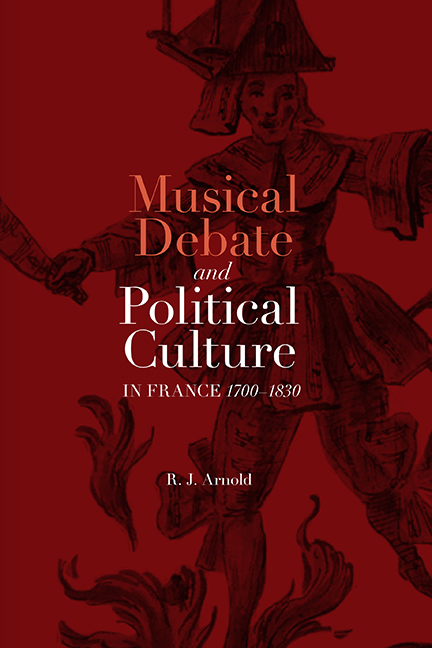Book contents
- Frontmatter
- Contents
- List of Illustrations
- Introduction
- 1 Parallels, Comparisons and Ripostes: The Raguenet–Lecerf Controversy, 1702–32
- 2 Spectators, Satirists and Sectarians: The Ramiste–Lulliste Querelle, 1733–51
- 3 'A Vast Negotiation': The Querelle des Bouffons, 1752–54
- 4 The Spirit of Contradiction: The Gluckiste–Piccinniste Querelle, 1774–88
- 5 A Revolutionary Interlude: 1789–1800
- 6 The End of the Party: New Avenues for Musical Dispute, 1800–30
- Conclusion
- Select Bibliography
- Index
- Music in Society and Culture
Conclusion
Published online by Cambridge University Press: 29 May 2021
- Frontmatter
- Contents
- List of Illustrations
- Introduction
- 1 Parallels, Comparisons and Ripostes: The Raguenet–Lecerf Controversy, 1702–32
- 2 Spectators, Satirists and Sectarians: The Ramiste–Lulliste Querelle, 1733–51
- 3 'A Vast Negotiation': The Querelle des Bouffons, 1752–54
- 4 The Spirit of Contradiction: The Gluckiste–Piccinniste Querelle, 1774–88
- 5 A Revolutionary Interlude: 1789–1800
- 6 The End of the Party: New Avenues for Musical Dispute, 1800–30
- Conclusion
- Select Bibliography
- Index
- Music in Society and Culture
Summary
WHY was it, asked François-Benoît Hoffman in 1821 in the pages of the Journal des Débats, that the French argued about music at such length and with such ferocity? The Italians certainly quarrelled about the merits of individual musicians, but were of one accord about what constituted good music; the Germans, essentially reasonable people, were content with a marriage of Italian vocal melody and their own notions of harmony. But the French could not allow any aspect of opera to go undisputed: not only was there no generally accepted national school of thought about music, but some commentators seemed positively to revel in turning against their own and stirring up dissent. ‘Do you wish to pass for a fine connoisseur? Pitilessly vilify all French composers, and treat everyone who applauds them as asses.’ In a way, Hoffman conceded, this was a function of the unparalleled sophistication of French intellectual life, but if the result was constant strife, it was a poor measure of superiority.
Hoffman thought he had an explanation for why this happened. There was really hardly any substance to these disputes, he argued; they were not even disputes about words, which in a highly literary culture had the potential to gain real momentum. Instead, they surely resulted from the fact that every musician was differently gifted. Some were particularly adept at melody, others at the more savant technicalities of harmony; very few married all the various aspects of musical creation in equal measure. Given the competitive nature of their trade, they tended therefore to transform these accidents of nature into aesthetic principles and to encourage their supporters to rally round. There were no differences of principle at stake, since the most mélodiste composer acknowledged the central importance of harmony, and no harmoniste argued against the existence of melody. ‘If you ask any of them individually what qualities constitute a masterpiece, they will all tell you that correct expression of the words, beautiful melody and beautiful harmony make up a perfect work.’ Rather, it was all a question of self-esteem and professional jealousy.
- Type
- Chapter
- Information
- Musical Debate and Political Culture in France, 1700–1830 , pp. 209 - 213Publisher: Boydell & BrewerPrint publication year: 2017

